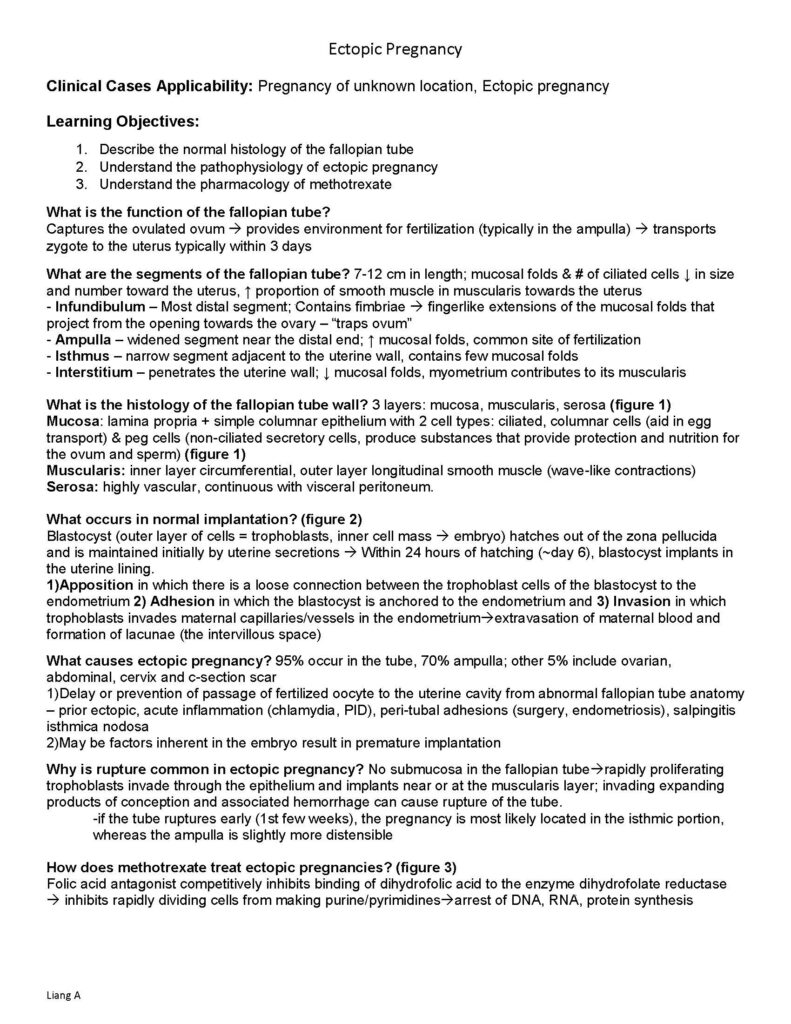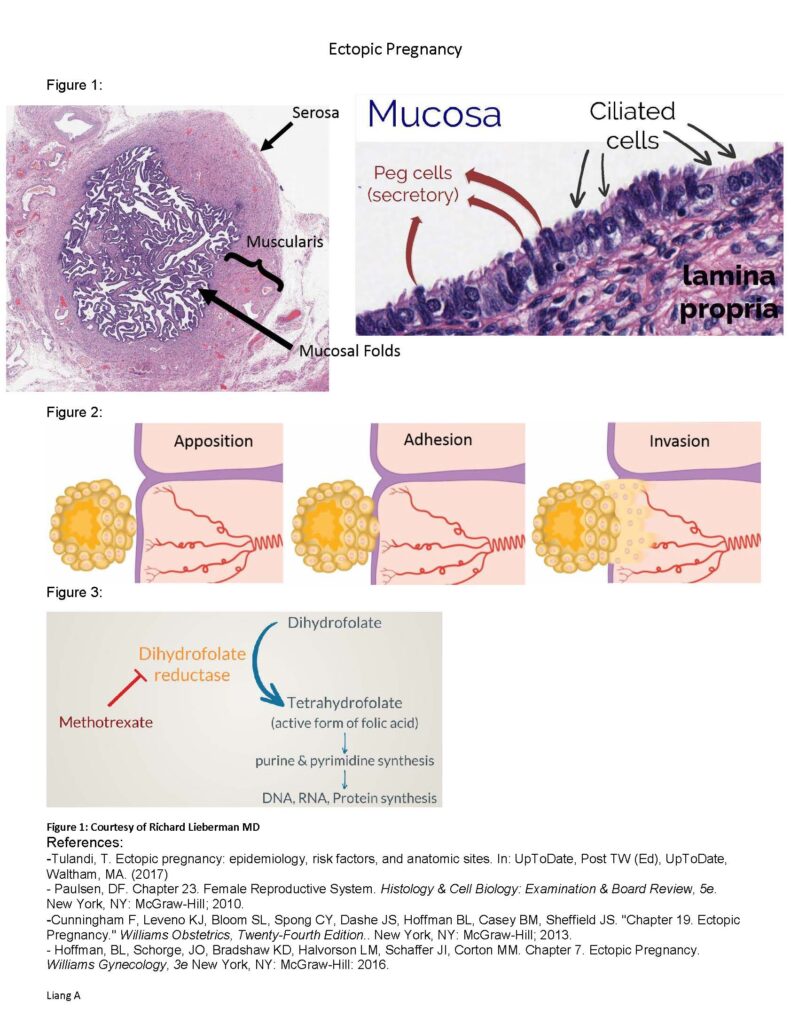Ectopic Pregnancy
Duration 10:20
Ectopic Pregnancy
Liang A
Clinical Cases Applicability: Pregnancy of unknown location, Ectopic pregnancy
Learning Objectives:
1. Describe the normal histology of the fallopian tube
2. Understand the pathophysiology of ectopic pregnancy
3. Understand the pharmacology of methotrexate
What is the function of the fallopian tube?
Captures the ovulated ovum provides environment for fertilization (typically in the ampulla) transports zygote to the uterus typically within 3 days
What are the segments of the fallopian tube? 7-12 cm in length; mucosal folds & # of ciliated cells ↓ in size and number toward the uterus, ↑ proportion of smooth muscle in muscularis towards the uterus
– Infundibulum – Most distal segment; Contains fimbriae fingerlike extensions of the mucosal folds that project from the opening towards the ovary – “traps ovum”
– Ampulla – widened segment near the distal end; ↑ mucosal folds, common site of fertilization
– Isthmus – narrow segment adjacent to the uterine wall, contains few mucosal folds
– Interstitium – penetrates the uterine wall; ↓ mucosal folds, myometrium contributes to its muscularis
What is the histology of the fallopian tube wall? 3 layers: mucosa, muscularis, serosa (figure 1)
Mucosa: lamina propria + simple columnar epithelium with 2 cell types: ciliated, columnar cells (aid in egg transport) & peg cells (non-ciliated secretory cells, produce substances that provide protection and nutrition for the ovum and sperm) (figure 1)
Muscularis: inner layer circumferential, outer layer longitudinal smooth muscle (wave-like contractions)
Serosa: highly vascular, continuous with visceral peritoneum.
What occurs in normal implantation? (figure 2)
Blastocyst (outer layer of cells = trophoblasts, inner cell mass embryo) hatches out of the zona pellucida and is maintained initially by uterine secretions Within 24 hours of hatching (~day 6), blastocyst implants in the uterine lining.
1)Apposition in which there is a loose connection between the trophoblast cells of the blastocyst to the endometrium 2) Adhesion in which the blastocyst is anchored to the endometrium and 3) Invasion in which trophoblasts invades maternal capillaries/vessels in the endometriumextravasation of maternal blood and formation of lacunae (the intervillous space)
What causes ectopic pregnancy? 95% occur in the tube, 70% ampulla; other 5% include ovarian, abdominal, cervix and c-section scar
1)Delay or prevention of passage of fertilized oocyte to the uterine cavity from abnormal fallopian tube anatomy – prior ectopic, acute inflammation (chlamydia, PID), peri-tubal adhesions (surgery, endometriosis), salpingitis isthmica nodosa
2)May be factors inherent in the embryo result in premature implantation
Why is rupture common in ectopic pregnancy? No submucosa in the fallopian tuberapidly proliferating trophoblasts invade through the epithelium and implants near or at the muscularis layer; invading expanding products of conception and associated hemorrhage can cause rupture of the tube.
-if the tube ruptures early (1st few weeks), the pregnancy is most likely located in the isthmic portion, whereas the ampulla is slightly more distensible
How does methotrexate treat ectopic pregnancies? (figure 3)
Folic acid antagonist competitively inhibits binding of dihydrofolic acid to the enzyme dihydrofolate reductase inhibits rapidly dividing cells from making purine/pyrimidinesarrest of DNA, RNA, protein synthesis Ectopic Pregnancy
Liang A
Figure 1:
Figure 2:
Figure 3:
Figure 1: Courtesy of Richard Lieberman MD
References:
–Tulandi, T. Ectopic pregnancy: epidemiology, risk factors, and anatomic sites. In: UpToDate, Post TW (Ed), UpToDate, Waltham, MA. (2017)
– Paulsen, DF. Chapter 23. Female Reproductive System. Histology & Cell Biology: Examination & Board Review, 5e. New York, NY: McGraw-Hill; 2010.
–Cunningham F, Leveno KJ, Bloom SL, Spong CY, Dashe JS, Hoffman BL, Casey BM, Sheffield JS. “Chapter 19. Ectopic Pregnancy.” Williams Obstetrics, Twenty-Fourth Edition.. New York, NY: McGraw-Hill; 2013.
– Hoffman, BL, Schorge, JO, Bradshaw KD, Halvorson LM, Schaffer JI, Corton MM. Chapter 7. Ectopic Pregnancy. Williams Gynecology, 3e New York, NY: McGraw-Hill: 2016.


